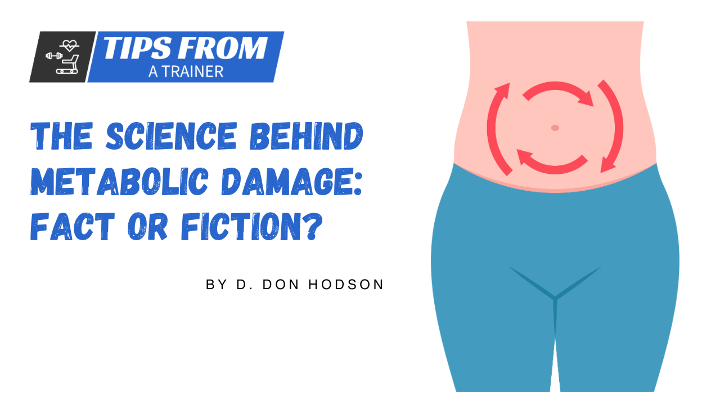Introduction
In the modern pursuit of health and wellness, the term "metabolic damage" has gained attention, sparking debates and discussions among fitness enthusiasts, healthcare professionals, and individuals striving to achieve their desired weight and body composition. The concept suggests that intense dieting and calorie restriction could lead to long-lasting negative effects on the body's metabolism, potentially hampering weight loss efforts and triggering a cycle of frustration. This article delves into the science behind the notion of metabolic damage, seeking to clarify whether it is a legitimate concern or a misconceived notion in the realm of health and fitness.
Table of Contents
Introduction
Understanding Metabolism
Defining Metabolism
Metabolic Rate and Energy Expenditure
Factors Influencing Metabolism
Debunking Metabolic Damage Myths
The Myth of Permanent Damage
The Role of Adaptive Thermogenesis
Metabolism and Weight Loss Plateaus
Exploring the Set-Point Theory
What is the Set-Point Theory?
Adaptive Responses to Weight Loss
Implications for Metabolic Function
Realities of Metabolic Adaptation
Evidence of Metabolic Changes
Time Frame for Metabolic Adaptation
Strategies to Mitigate Adaptation
The Psychological Aspect of Metabolism
Impact of Dieting on Psychological Well-being
Stress, Hormones, and Metabolism
Mindful Eating and Metabolic Health
Long-Term Metabolic Outlook
Sustainable Weight Management
Balancing Caloric Intake and Expenditure
Strategies for Reviving Metabolic Rate
Conclusion

Understanding Metabolism
Defining Metabolism
Metabolism is a complex network of biochemical processes that occur within the body to convert the food we consume into energy. This energy is utilized to power various bodily functions, including digestion, breathing, circulation, and cell repair. The efficiency of these processes plays a crucial role in determining an individual's energy balance and, consequently, their body weight and composition.
Metabolism involves two primary processes: catabolism and anabolism. Catabolism breaks down larger molecules, such as carbohydrates, fats, and proteins, into smaller components, releasing energy in the process. Anabolism, on the other hand, involves the synthesis of new molecules, using energy to build complex substances like proteins and nucleic acids.
Metabolic Rate and Energy Expenditure
Metabolic rate refers to the rate at which the body expends energy while at rest, known as the basal metabolic rate (BMR). This energy expenditure sustains vital functions like maintaining body temperature and supporting organ function. Additional energy is expended during physical activities, such as exercise and daily tasks, contributing to the total daily energy expenditure (TDEE).
Metabolic rate can vary significantly among individuals and is influenced by factors such as genetics, age, sex, body composition, and hormonal levels. Lean muscle mass tends to be more metabolically active than fat tissue, meaning that individuals with higher muscle mass may have a higher basal metabolic rate.
Factors Influencing Metabolism
Several factors influence an individual's metabolic rate and overall metabolism:
1. Genetics:
Genetic factors play a role in determining an individual's baseline metabolic rate. Some people are naturally predisposed to a higher metabolism, while others may have a slower metabolic rate.
2. Age:
Metabolism tends to slow down with age, primarily due to decreases in muscle mass and hormonal changes.
3. Body Composition:
Muscle tissue is more metabolically active than fat tissue. Therefore, individuals with a higher proportion of muscle tend to have a higher metabolic rate.
4. Physical Activity:
Regular physical activity, particularly strength training and aerobic exercise, can boost metabolic rate both during and after exercise.
5. Hormones:
Hormones, such as thyroid hormones, play a significant role in regulating metabolism. Thyroid hormones, for instance, influence the rate of energy expenditure.
6. Nutrition:
The thermic effect of food (TEF) contributes to energy expenditure, as the body expends energy to digest, absorb, and process nutrients.
7. Caloric Intake:
Consuming fewer calories than the body requires leads to a calorie deficit and can impact metabolic rate.
Understanding these factors provides insight into the intricate nature of metabolism and its role in weight management and overall health. In the subsequent sections, we will explore the concept of metabolic damage and its implications, aiming to decipher whether it holds scientific merit or falls within the realm of misconception.
Debunking Metabolic Damage Myths
The Myth of Permanent Damage
The notion of metabolic damage often revolves around the fear that severe calorie restriction or prolonged dieting can lead to irreversible harm to the metabolism. However, the concept of permanent metabolic damage is not entirely supported by scientific evidence. While it is true that the body undergoes adaptive changes in response to calorie restriction, these changes are often reversible when appropriate interventions are employed.
The Role of Adaptive Thermogenesis
Adaptive thermogenesis refers to the body's natural response to reduced caloric intake. When faced with a decrease in energy intake, the body may lower its metabolic rate as a means of conserving energy. This adaptive response serves as a survival mechanism, ensuring that vital functions continue despite limited energy availability.
Adaptive thermogenesis involves a reduction in both resting metabolic rate (RMR) and non-resting energy expenditure (NREE), which includes energy expended during physical activities. The decrease in energy expenditure can lead to weight loss plateaus, which may contribute to the belief in metabolic damage.
Metabolism and Weight Loss Plateaus
Weight loss plateaus are common occurrences during the course of a weight loss journey. They occur due to the body's adaptive response to calorie restriction, where metabolic rate adjusts to the new energy intake. As a result, the initial rate of weight loss may slow down, leading to frustration and the perception of metabolic damage.
However, weight loss plateaus are not necessarily indicative of permanent metabolic damage. Instead, they highlight the body's remarkable ability to adapt to changes in energy balance. The key is to recognize that weight loss plateaus are a natural part of the process and can often be overcome with appropriate adjustments to diet and exercise.
Exploring the Set-Point Theory
What is the Set-Point Theory?
The set-point theory proposes that the body has a predetermined weight range that it seeks to maintain. This range is regulated by physiological mechanisms that influence hunger, appetite, and metabolic rate. When an individual's weight deviates from this set point, the body responds by initiating changes to bring the weight back within the established range.
The set-point theory implies that attempts to lose a significant amount of weight may trigger a series of physiological adaptations aimed at restoring the original weight. These adaptations may include alterations in hunger hormones, increased appetite, and a reduction in metabolic rate.
Adaptive Responses to Weight Loss
When weight loss occurs, the body perceives the decrease in energy stores and responds by increasing appetite and decreasing energy expenditure. This adaptive response is intended to restore lost weight and safeguard against potential energy shortages.
Hunger hormones, such as ghrelin, increase after weight loss, promoting feelings of hunger and potentially driving overeating. Additionally, reduced energy expenditure, both at rest and during physical activities, can contribute to the body's efforts to regain lost weight.
Implications for Metabolic Function
The set-point theory has important implications for metabolic function. It suggests that attempts to sustain weight loss below the body's set point may be met with resistance from physiological mechanisms aimed at maintaining the original weight. This can make long-term weight maintenance challenging and may contribute to the perception of metabolic damage.
However, it is important to note that the set-point theory does not imply irreversible metabolic damage. Instead, it highlights the body's natural tendency to resist significant deviations from its established weight range. Strategies for managing metabolic adaptations and achieving sustainable weight management will be discussed in subsequent sections, shedding light on effective approaches for navigating the complexities of metabolism and weight loss.
Realities of Metabolic Adaptation
Evidence of Metabolic Changes
Scientific research has provided compelling evidence of metabolic changes in response to weight loss. When individuals reduce their caloric intake, the body adjusts its energy expenditure in order to match the reduced energy intake. Studies have shown that metabolic adaptations can occur in various ways, including reductions in resting metabolic rate (RMR), non-resting energy expenditure (NREE), and spontaneous physical activity.
In one study, participants who underwent a period of controlled caloric restriction exhibited a decrease in RMR, which was not entirely accounted for by changes in body composition. Similarly, NREE, which includes energy expended through activities like fidgeting and voluntary movement, decreased following weight loss. These findings highlight the body's ability to adjust its energy expenditure to align with lower caloric intake, contributing to the phenomenon of metabolic adaptation.
Time Frame for Metabolic Adaptation
Metabolic adaptation does not occur instantaneously; rather, it is a gradual process that unfolds over time. The exact time frame can vary among individuals, but it is generally observed that the body's energy expenditure begins to decrease as weight loss progresses. Studies have indicated that significant metabolic changes may become more pronounced after several weeks of sustained caloric restriction.
Furthermore, metabolic adaptation appears to be influenced by the extent of weight loss. As individuals lose a larger proportion of their initial body weight, the magnitude of metabolic adaptation tends to increase. This underscores the importance of considering the potential for metabolic changes when embarking on weight loss journeys, especially those involving substantial weight reduction.
Strategies to Mitigate Adaptation
While metabolic adaptation is a natural response to weight loss, there are strategies that can be employed to mitigate its effects and support long-term success. One such strategy is incorporating planned diet breaks, where individuals temporarily increase their caloric intake to maintenance levels before resuming caloric restriction. These breaks can help prevent the body from adapting to the lower caloric intake and potentially mitigate reductions in metabolic rate.
Another approach is reverse dieting, which involves gradually increasing caloric intake after a period of dieting. This gradual increase allows the body to adjust to higher energy levels while minimizing the risk of rapid weight regain. Additionally, engaging in progressive resistance training and maintaining an active lifestyle can help preserve muscle mass and support metabolic function, ultimately contributing to the prevention of excessive metabolic adaptation.
The Psychological Aspect of Metabolism
Impact of Dieting on Psychological Well-being
The pursuit of weight loss often involves changes not only to the body but also to the mind. Dieting and restrictive eating patterns can have significant psychological effects on individuals. The focus on strict caloric intake, food choices, and weight-related goals can lead to increased stress and anxiety. These emotional responses can have implications for metabolic function through the intricate connection between the brain and body.
Stress, Hormones, and Metabolism
Stress is a well-known contributor to hormonal changes in the body, and these hormonal shifts can influence metabolic processes. Chronic stress, often experienced during prolonged periods of dieting, can lead to increased production of cortisol, commonly referred to as the "stress hormone." Elevated cortisol levels have been associated with alterations in metabolism, including an increased preference for storing fat in the abdominal area.
Furthermore, stress-induced hormonal changes can impact hunger and appetite regulation, potentially leading to overeating or binge eating episodes. This cycle of stress-induced eating can disrupt the delicate balance between caloric intake and expenditure, affecting metabolic function and contributing to the challenges of weight management.
Mindful Eating and Metabolic Health
Mindful eating, a practice rooted in mindfulness, encourages individuals to pay close attention to their eating experience, including the taste, texture, and sensations associated with food consumption. This approach promotes a balanced and nonjudgmental relationship with food, which can positively influence psychological well-being and metabolic health.
Engaging in mindful eating has been shown to reduce stress levels and improve emotional regulation. By fostering a more relaxed and mindful approach to eating, individuals may experience reduced cortisol levels and improved hormonal balance. Moreover, mindful eating can help prevent overeating, as individuals become attuned to their body's hunger and fullness cues, promoting a healthier energy balance and supporting metabolic function.
The intricate interplay between psychological well-being, stress hormones, and metabolism underscores the importance of adopting holistic approaches to weight management that prioritize mental health alongside physical health.
Long-Term Metabolic Outlook
Sustainable Weight Management
Sustainable weight management is a key factor in maintaining a healthy metabolic outlook. Instead of resorting to extreme diets or rapid weight loss methods, focusing on sustainable lifestyle changes is crucial. Gradual, achievable changes to dietary habits and physical activity levels can help prevent drastic metabolic adaptations that may occur with more aggressive approaches.
Sustainable weight management involves adopting an eating pattern that is not overly restrictive and is conducive to long-term adherence. Emphasizing a balanced diet rich in whole foods, including vegetables, fruits, lean proteins, and whole grains, provides essential nutrients while supporting metabolic function. Incorporating regular physical activity into daily routines further contributes to a well-functioning metabolism.
Balancing Caloric Intake and Expenditure
Maintaining a healthy metabolism requires a delicate balance between caloric intake and energy expenditure. Consuming an appropriate number of calories to meet the body's energy needs is crucial for supporting metabolic function. Overeating and consuming excessive calories beyond the body's requirements can contribute to weight gain and potential metabolic dysfunction.
On the other hand, extreme caloric restriction can trigger adaptive responses that lead to metabolic slowdown. Striking the right balance by aligning caloric intake with energy expenditure promotes a stable metabolic rate and facilitates weight management. Regular monitoring of body weight and adjustments to caloric intake based on changes in physical activity levels can aid in maintaining this equilibrium.
Strategies for Reviving Metabolic Rate
For individuals who have experienced significant metabolic adaptation due to weight loss or dieting, there are strategies that may help in reviving metabolic rate. Gradually increasing caloric intake can signal to the body that it is no longer in a state of energy deprivation, potentially leading to a modest increase in metabolic rate. This approach should be gradual and monitored to prevent rapid weight regain.
Engaging in strength training and resistance exercises can also play a role in reviving metabolic rate. Building and preserving lean muscle mass through resistance training contributes to a higher resting metabolic rate, as muscle tissue requires more energy to maintain compared to fat tissue. Incorporating regular strength training sessions into a fitness routine can contribute to metabolic health over the long term.
Conclusion
In conclusion, the concept of metabolic damage is a multifaceted subject that warrants careful consideration and exploration. While the term "metabolic damage" may not accurately describe the phenomenon, the scientific literature supports the existence of metabolic adaptations in response to weight loss and caloric restriction. These adaptations, which include reductions in resting metabolic rate and changes in hormone levels, are the body's natural mechanisms to adjust to changes in energy balance.
Understanding the complexities of metabolism, including factors influencing metabolic rate and the role of adaptive thermogenesis, is essential for informed decision-making in weight management. The set-point theory sheds light on how the body strives to maintain a stable weight range, influencing metabolic responses to weight loss.
Realities of metabolic adaptation, such as evidence of metabolic changes and strategies to mitigate these adaptations, highlight the importance of approaching weight loss and maintenance with a long-term perspective. Additionally, recognizing the psychological impact of dieting and stress on metabolism underscores the interconnectedness of mind and body.
Looking ahead, the pursuit of sustainable weight management and the integration of balanced caloric intake, expenditure, and mindful eating practices play crucial roles in nurturing a healthy metabolic outlook. While metabolic adaptation is a reality, it does not signify permanent damage. Rather, it underscores the body's remarkable ability to adapt and maintain equilibrium in the face of changing circumstances.
In navigating the complexities of metabolism, individuals can empower themselves with knowledge and strategies that promote overall well-being and metabolic health. By embracing sustainable practices and focusing on holistic approaches, we can work towards achieving a harmonious relationship between our metabolic systems and our broader health goals.

Don Hodson, Certified Personal Trainer
I'm Don, an ACE-certified personal trainer and the founder of Tips From A Trainer. With my passion for fitness and years of experience, I've helped countless individuals transform their physiques!
Having personally overcome weight challenges throughout my life, I understand the struggle. Through consistency, exercise, and a balanced diet, I have managed to stay in shape and I want to share my message with the world!
The fitness industry is fraught with misconceptions and deceptive practices, which is why I am committed to providing you with the truth.
- My Site: www.Don-Hodson.com
- My Company: www.ConnectedAgeMarketing.com

The Science Behind Metabolic Damage